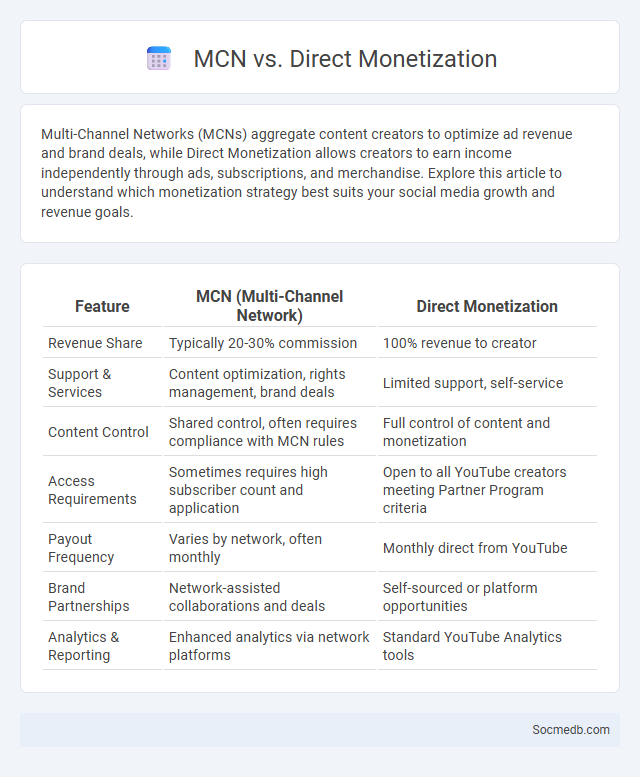
Photo illustration: MCN vs Direct Monetization
Multi-Channel Networks (MCNs) aggregate content creators to optimize ad revenue and brand deals, while Direct Monetization allows creators to earn income independently through ads, subscriptions, and merchandise. Explore this article to understand which monetization strategy best suits your social media growth and revenue goals.
Table of Comparison
| Feature | MCN (Multi-Channel Network) | Direct Monetization |
|---|---|---|
| Revenue Share | Typically 20-30% commission | 100% revenue to creator |
| Support & Services | Content optimization, rights management, brand deals | Limited support, self-service |
| Content Control | Shared control, often requires compliance with MCN rules | Full control of content and monetization |
| Access Requirements | Sometimes requires high subscriber count and application | Open to all YouTube creators meeting Partner Program criteria |
| Payout Frequency | Varies by network, often monthly | Monthly direct from YouTube |
| Brand Partnerships | Network-assisted collaborations and deals | Self-sourced or platform opportunities |
| Analytics & Reporting | Enhanced analytics via network platforms | Standard YouTube Analytics tools |
Introduction to Content Monetization Models
Content monetization models on social media platforms primarily include advertising revenue, subscription services, sponsored posts, and affiliate marketing. Influencers and creators leverage these models by producing engaging content that attracts followers, enabling direct income through brand partnerships or platform-specific programs like YouTube's Partner Program or Instagram's branded content tools. Emerging models also incorporate fan support mechanisms such as Patreon or TikTok's Creator Fund to diversify creators' revenue streams.
What is an MCN?
A Multi-Channel Network (MCN) is a company that partners with multiple YouTube creators to offer services such as audience development, content optimization, and monetization strategies. MCNs provide creators access to better advertising rates, brand deals, and technical support to grow their channels efficiently. By leveraging data analytics and market insights, MCNs help maximize video reach and revenue generation across social media platforms.
Understanding Direct Monetization
Direct monetization on social media allows you to earn income by leveraging platforms' built-in features such as ad revenue sharing, subscription services, and virtual gift systems. Understanding how to optimize content for algorithms, engage your audience, and utilize monetization tools like YouTube Super Chats or Instagram Badges is essential for maximizing earnings. Your active participation and strategic content planning directly influence your revenue potential on platforms like TikTok, Twitch, and Facebook.
Key Differences: MCN vs Direct Monetization
MCNs (Multi-Channel Networks) aggregate multiple content creators, offering services like audience development, brand deals, and monetization support, while taking a revenue share; direct monetization allows creators to earn independently through platform features such as ads, memberships, and super chats, retaining full control and revenue. Your choice depends on the desired balance between support, revenue share, and autonomy. MCNs can accelerate growth and provide resources, but direct monetization maximizes earnings and creative freedom.
Pros and Cons of MCNs
Multi-Channel Networks (MCNs) offer You enhanced monetization opportunities on social media platforms like YouTube through brand partnerships and access to production resources. However, MCNs sometimes impose restrictive contracts that can limit your content control and revenue share. Evaluating these pros and cons is crucial to maximize benefits without sacrificing creative freedom or income.
Pros and Cons of Direct Monetization
Direct monetization on social media platforms offers you a powerful opportunity to generate income through features like sponsored content, subscription models, and ad revenue sharing. However, it can also lead to content pressure, audience fatigue, and potential dependency on platform algorithms that may change unpredictably. Balancing monetization strategies with authentic engagement is crucial to maintaining long-term success and audience trust.
Revenue Sharing: MCN vs Direct Monetization
Revenue sharing models vary significantly between Multi-Channel Networks (MCNs) and direct monetization on social media platforms, affecting your earnings potential. MCNs typically take 20-40% of ad revenue in exchange for promotional support, content optimization, and brand deals, whereas direct monetization through platforms like YouTube offers up to 55% ad revenue to creators. Choosing direct monetization maximizes your income while MCNs provide added services that can boost overall channel growth and income diversification.
Control and Creative Freedom Comparison
Social media platforms offer varying levels of control and creative freedom, impacting how you tailor content to specific audiences. Instagram emphasizes visual storytelling with extensive tools like filters and reels, granting creators high creative freedom but limited control over algorithm changes. In contrast, LinkedIn focuses on professional content curation with more control over audience targeting but fewer creative customization options.
Which Model Suits Different Creator Types?
Different social media models cater to various creator types based on content format and audience engagement. Video-centric platforms like TikTok and YouTube suit visual storytellers and entertainers, while writing-focused sites such as Medium support bloggers and journalists. Creators aiming for niche community interaction benefit from platforms like Discord or Patreon that emphasize direct fan support and exclusive content.
Conclusion: Choosing the Best Monetization Path
Selecting the optimal social media monetization strategy depends on audience demographics, engagement rates, and platform algorithms. Influencer partnerships, affiliate marketing, and direct product sales each offer unique revenue potentials tailored to niche markets. Data-driven decisions maximize earning opportunities while maintaining authentic content that resonates with followers.
 socmedb.com
socmedb.com